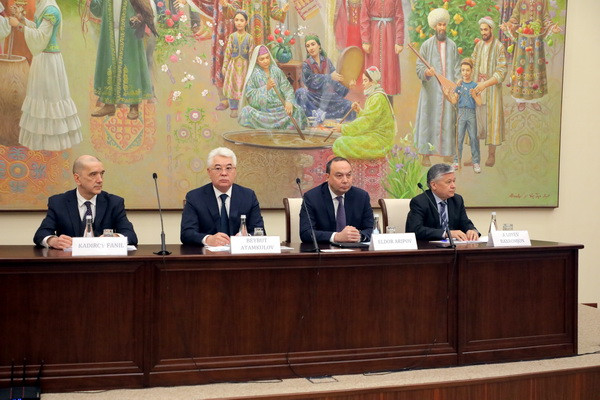
E. Aripov: "It is important to maintain the high dynamics of bilateral relations and the trusting nature of the partnership"
Tashkent, Uzbekistan (UzDaily.com) -- On 27 December, Tashkent hosted an international conference on the topic “Uzbekistan and Kazakhstan. Prospects for the development of strategic partnership and alliance”, dedicated to the results of the visit of the President of Kazakhstan to Uzbekistan and high-level negotiations.
The event, organized by the Institute for Strategic and Interregional Studies under the President of the Republic of Uzbekistan (ISMI) together with the International Institute of Central Asia (MICA) in partnership with the Kazakhstan Institute for Strategic Studies under the President of the Republic of Kazakhstan (KISS), was attended by experts from leading think tanks, representatives of ministries foreign affairs of the two countries, as well as the diplomatic corps accredited in Uzbekistan.
Director of ISMI E. Aripov is sure that the decisions made during the visit of Kassym-Jomart Tokayev on the supply, transit and processing of hydrocarbons, as well as on the implementation of projects in the field of construction and modernization of energy facilities, will strengthen the energy security of Uzbekistan and Kazakhstan.
According to the expert, these efforts are especially in demand against the backdrop of high uncertainty and price volatility in the global energy market.
At the same time, as E. Aripov noted, in the context of limited opportunities for traditional transport and transit corridors and the transport isolation of the region, it became urgent to strengthen joint work to improve and diversify the transport systems of the two countries.
In this context, according to the expert, the agreements reached between Uzbekistan and Kazakhstan can multiply the volume of transported goods, accelerate the implementation of both planned and new transport and logistics projects. He is sure that all this will create additional strategic opportunities for both countries.
As an example, the director of ISMI cited a project for the construction of a modern multimodal transport and logistics center in the Tashkent region. According to experts, it should bring great benefits, since the Center will increase the logistics potential for international cargo along the East-West and North-South routes.
Meanwhile, the expert announced the specific results of the close coordination of the transport policy pursued by Uzbekistan and Kazakhstan.
According to him, thanks to the mutual provision of preferences, optimization of tariffs, improvement of border infrastructure, the countries succeeded in 2021. to increase the volume of road freight transportation by 41% - up to 1.5 million tons.
Along with this, E. Aripov in his speech made a special emphasis on the efforts of the two countries in combating the consequences of climate change.
The rapid warming of temperatures in the region is already leading to a shortage of water resources, an acceleration in the rate of land degradation, and an increase in natural disasters.
According to the World Bank forecasts, by 2050 only due to the impact of climate change, the region’s GDP growth will decrease by 11%.
In this regard, according to the expert, the signing of the Agreement on bilateral cooperation in the field of environmental protection, as well as the intention of the parties to strengthen cooperation to mitigate the negative consequences of the Aral tragedy, became extremely important.
On the whole, as E. Aripov noted, the coverage of the areas of bilateral cooperation is, of course, impressive and this is quite objective. Since Uzbekistan and Kazakhstan are the two leading countries of Central Asia, which feel and are responsible not only for themselves, but also for the region as a whole. The challenges faced by each country individually are of a common nature. The expert believes that "without combining joint efforts, a real result cannot be achieved."
Therefore, he expresses his conviction that the expansion of interaction will certainly continue. After all, the potential for cooperation is far from being exhausted, and the emergence of new challenges will only stimulate the search for adequate and joint responses by the parties.
In conclusion, the director of the ISMI emphasized the importance of maintaining the high dynamics of bilateral relations and the trusting nature of the partnership. According to him, the analytical and research structures of the two countries should play a big role in this process.